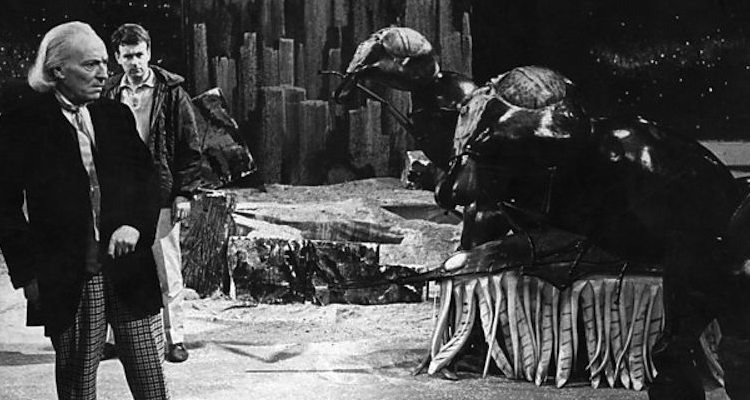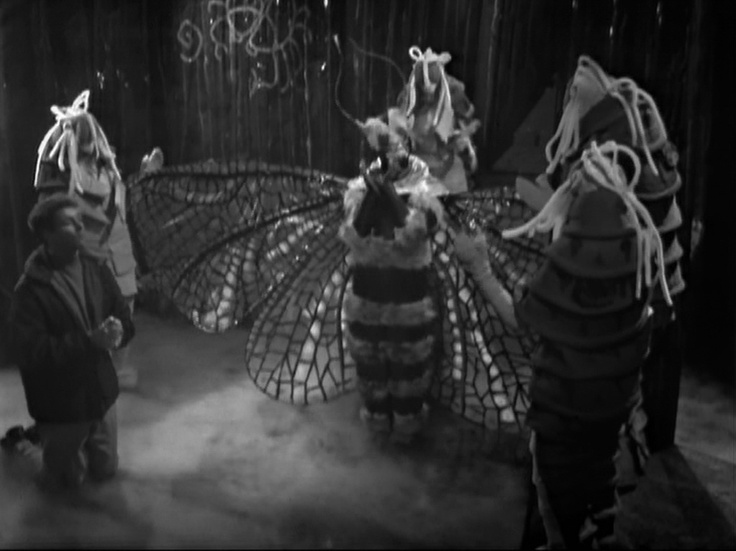DOCTOR WHO, SEASON 2 SERIAL 5:
THE WEB PLANET
Doctor: First (William Hartnell)
Companions: Ian, Barbara, Vicki
April 2023

Early Doctor Who is a strange beast.
The show took at least a year to find its footing and is practically unrecognizable compared to today’s high-budget, top-of-the-line 45-minute episodes. Not only due to the black and white film nor the serial format, but more along the lines of the show’s very structure: for example, the Doctor himself was much less the leading man until at least the show’s second year. Practically every other episode was a “pure historical” with no supernatural elements beyond the TARDIS. And also, as The Web Planet makes clear, the budget was about 20 quid an episode.
That’s an exaggeration, but The Web Planet really makes clear the limitations of the format. It’s perhaps the most ambitious serial yet, coming as it is about halfway through the show’s second season at a heavy six parts, with a cast composed almost entirely of non-human creatures. So what works, and what doesn’t?
Let’s start with what works. The first episode is truly lovely, a suspenseful and strange exploration of a new world with some wonderful character interactions between our main cast (especially the pairs of Ian and the Doctor and Barbara and Vicki). And at this point, the Doctor is finally settling into himself as a kindly old man with a slight mercurial streak, as opposed to the earlier episodes, where he came off as much more cruel than anything. Indeed, throughout the episode, the Doctor and Vicki stay together for almost all of it, and somehow manage to have a more compelling grandfather-and-granddaughter relationship than the Doctor and Susan almost ever managed to have, which is frankly tragic in retrospect. Vicki already has much more of a personality than Susan was ever allowed to have. Ian and Barbara continue to be standouts throughout, especially Ian as he’s given a little more to do (as per usual, unfortunately). And in terms of the alien world, it’s really rather compelling — especially the surface, which tends to look much better than the very flat corridors of the Carnosphere (carnidome? carnimax? I forget the name, frankly). But the cave systems Ian travels through and the temple where Barbara hides out with the Menoptra are quite nice overall, if a bit cramped. The TARDIS also continues to be a lovely set.

There are three species of aliens on the planet Vortis — four if you count larvae guns, and five if you count the Animus, the episode’s big bad — and...some of them work better than others. The Menoptra, with their flapping arms, singsong voices, and difficulty pronouncing the names Ian (“Heron”) and Barbara (“Abbuhrah”) work quite well because they truly feel strange, even as more or less just giant moth people. Especially Roslyn de Winter’s character, Vrestin, who Ian spends the most time with. Not to mention the fact that the effect of them flying comes off remarkably well— practical effects! Sometimes they’re great!
Sometimes they’re...not, though, as the Zarbi make clear. They’re...fine? I don’t hate them. Sure, it’s obvious that a pair of human legs stick out of the middle, but they’re large and bulky and weird. The problem with the Zarbi comes in how the plot and direction treats them: they are supposed to be terrifying, or at least dangerous: but the worst thing we see a Zarbi ever do is sort of loosely corral the Doctor and Vicki into range of a more dangerous enemy. This really suffers when the script attempts to do large-scale combat scenes in the middle episodes with the Menoptra: it just feels like...nothing is happening. It drags the story down unduly.
The Optera are...weird. While I like their overall design— subterranean pillbug-type creatures, humanoid but always bent over— their outfits are a little too reliant on foam in a very visible way, far from the carapaces of the Zarbi or the fluff of the Menoptra, and the muppet effect isn’t helped by the way they talk: every time the main Optera held a conversation I couldn’t help but think of Animal. The way they move, with awkward hops, also doesn’t really get anywhere. In fact, the best Optera moment in the serial (for me) is near the end, when they’re traveling through the caverns with Ian and one of them accidentally opens a pathway to one of the acid pools from above while digging. Ian tries to save them, but the lead Optera tells him not to because their compatriot’s body has to block the acid from reaching them. Maybe it’s just because I wasn’t expecting it and still thinking of them in quite a comical light, but together with the actually quite harrowing screaming and William Russell’s acting as Ian, it lent the moment a startling amount of pathos.
There’s very little to say about the larvae guns. They look a little bit like cute alien dogs, but then they also shoot lasers from their noses. The laser blasts are easily the most convincing bit of violence in the episode, killing at least one Menoptra. It’s a pity, then, that the guns weren’t given to the Zarbi, which would make a much more compelling enemy.
And finally we reach the Animus, the third creature to have a voice in the serial. The Animus is overall rather good: I like both the high concept of an alien intelligence slowly and organically growing over a planet and taking it over, as well as the conversations it has with the Doctor while he tries to trick it. The design of its core chamber is rather nice I think, at the very least by the standards of Doctor Who and the rest of this episode. But here’s where we get to another problem.
The final climactic confrontation should, you know, feel climactic. I say “should” to mean both in terms of story structure and in terms of, in this episode specifically, all the parts are there! What’s wrong? I’ll tell you: there is practically no score. For the entire episode, there is practically no score, and it undercuts the already-dubious tension throughout the whole serial.
Overall Thoughts:
The Web Planet has interesting ideas and comparatively poor execution. Watch it if you don’t mind some shoddy effects or if you’re interested in moth people, or ambitious early Doctor Who, and if you don’t mind some dragging. Don’t watch it if you care about how good it looks. In terms of Season 2, I’d rate this at the bottom, below Planet of Giants and The Romans — but that’s nowhere near as bad as the worst stories from Season 1: Season 2’s just been pretty consistent so far. However, that might change next time, when I look at The Crusade. Oof.